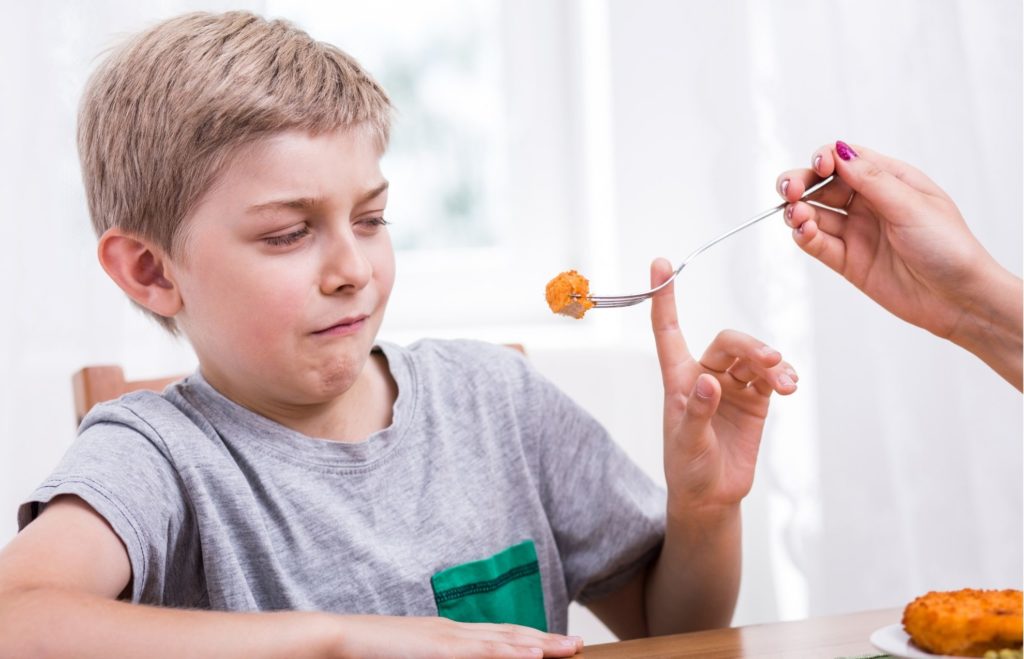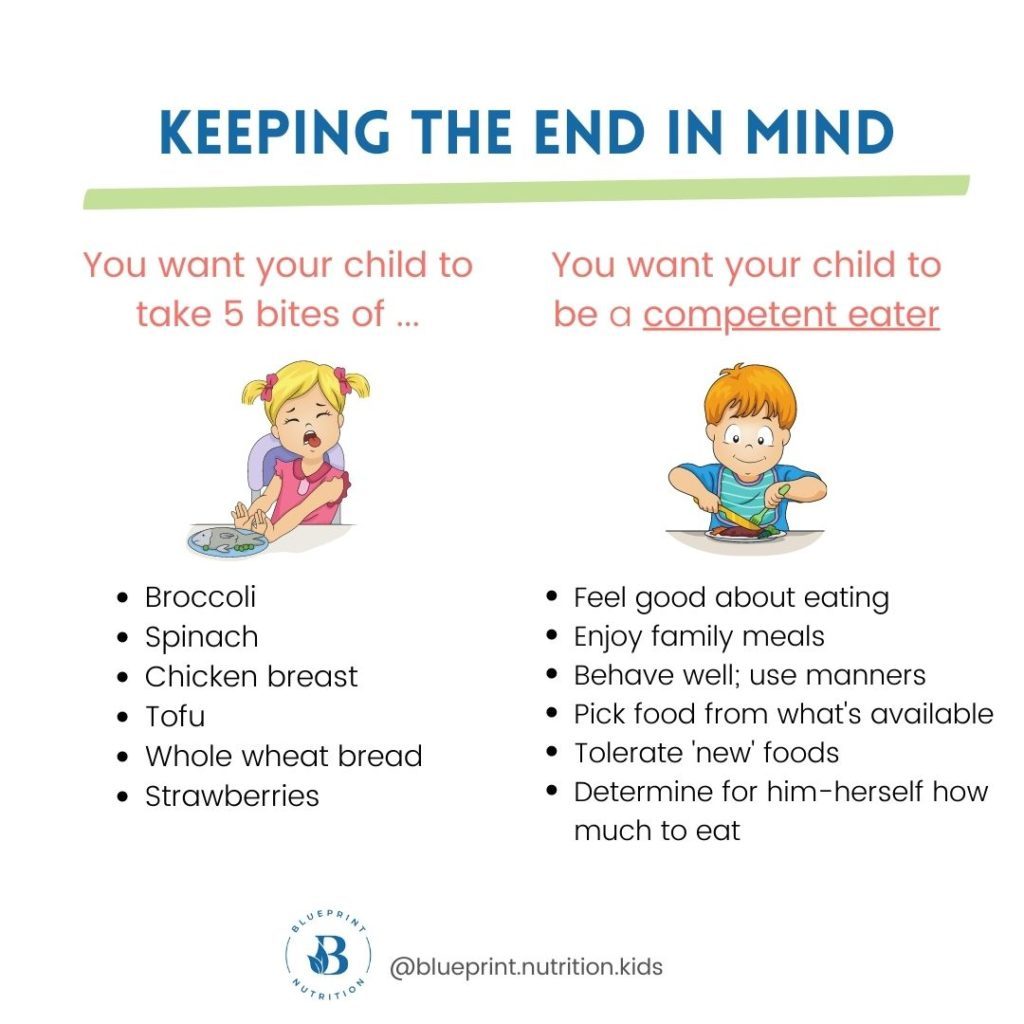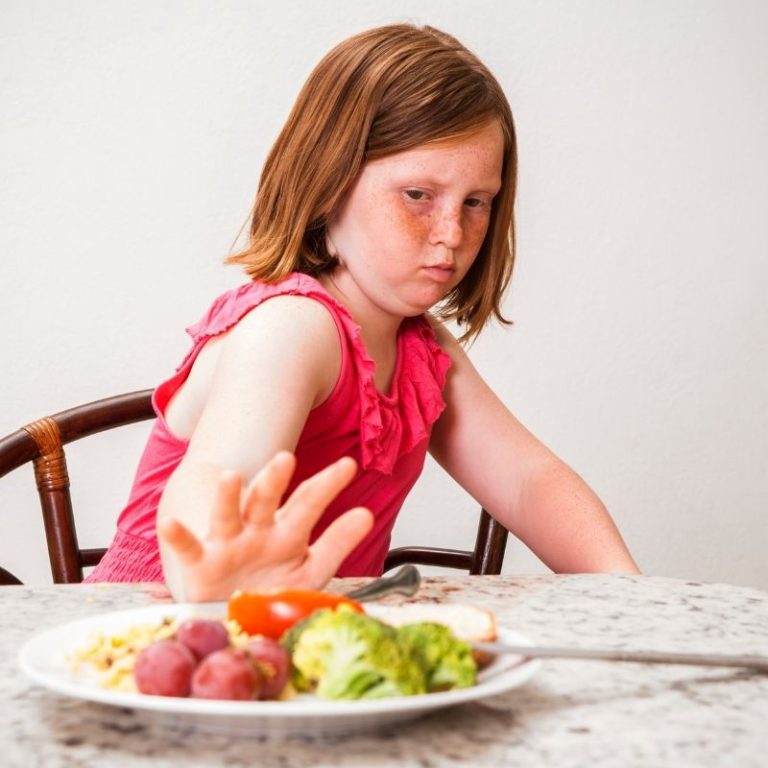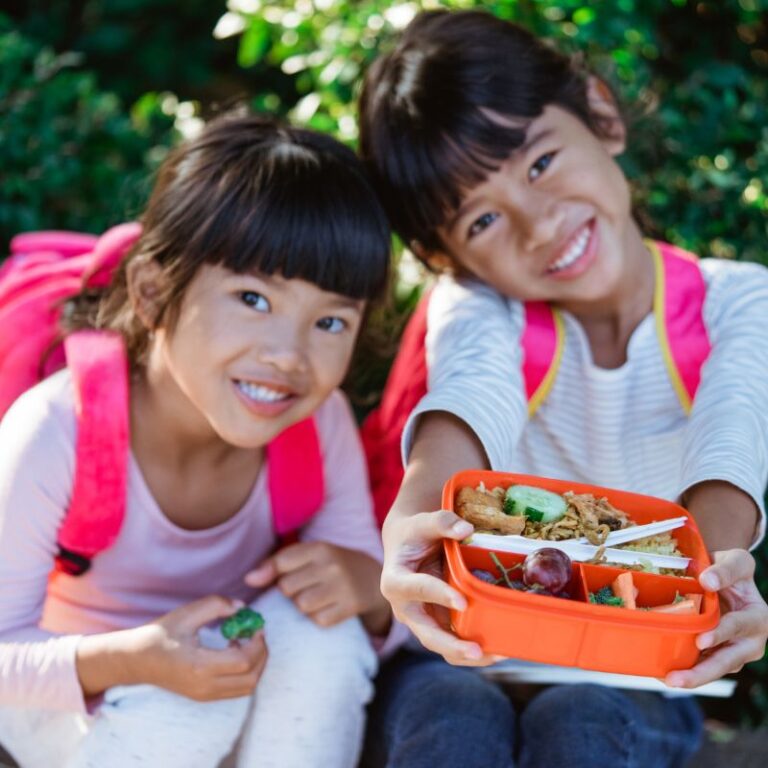You may have heard it called the “one bite rule” or the “one polite bite” or the “no thank you bite” or the “try it bite”. Regardless of what you call it, it’s the concept that a child (usually a picky eater) should take at least one bite of every food on their plate. Why should they take one bite to be polite? To make sure that at least try it!
Because if they only tried it (e.g. your hamburger soup!) they’d see just how wonderful it is!!
Although I dislike this rule (more on that later), like many things in the nutrition world, it’s not all black and white. There is nuance to it.
I’ve met families where this “one bite” rule works and their children try new foods and readily accept them. I’ve also met families where it does not work. At all! In fact it makes the picky eating situation worse.
Let’s break it down and see why this IS or IS NOT helping your child.
Why the “take one bite to be polite” rule IS working for your child
I recently chatted with a mom who has 3 kids: grade 1, grade 4 and grade 7. At their family meals she asks them to take 3 bites of a food before they can leave the table. She states that they each do this without complaining. Oftentimes they realize that they do enjoy the foods they try. They always enjoy a pleasant mealtime together.
Why does this rule seem to “work” for her or your own kids? Here are a few reasons:
Your kids are not actually picky eaters
I often hear of this approach working for families who do not have picky eaters. They may think their children are picky because they don’t like salad but they eat every other food known to man. (Perspective is everything!)
However, these parents share with the parents of a truly picky eater that this rule works and insist that they try it too. Unfortunately, this is not helpful advice for a parent of a truly picky eater. (More on this later).

Your kids have easy-going personalities.
Children who respond to this rule are generally more easy-going. These kids are more relaxed (at least around food) and don’t actually view this rule as a rule but simply as a thing our family does. No biggie.
Your kids are older.
Their brains have had more time to develop and they are able to use logic and reasoning in situations, including at the table. Asking them to take a bite makes sense. They can understand the premise behind the ask. Requiring 1, 2 or 5 bites doesn’t cause them to break down into a hysterical tantrum.
Why the “take one bite to be polite” rule IS NOT working for your child
As a dietitian who has specialized in pediatric nutrition for almost her entire career, I’ve met with hundreds of families who are struggling with picky eating. I can confidently say that 99.99% of the time, a rule such as “take one bite to be polite” DOES NOT WORK. And it can definitely make the situation worse.
Here are some reasons why it doesn’t work:
Your child has a strong-willed or anxious temperament
Do you have a lawyer on your hands? Whether you call it strong-willed, independent, persistent or stubborn, your child is determined not to do what you want him to do. No bites will be taken. He will sit there all night if he has to but he will win. You will lose.
Alternatively, you may have a cautious, anxious or nervous child who is filled with apprehension over having to eat something that does not look safe to her. Asking her to take a bite is adding to her anxiety and ultimate displeasure of being at the table. And on that note …
This rule adds pressure and makes mealtimes miserable!
Pretty much all feeding therapy experts (pediatricians, speech language-pathologists, occupational therapists and dietitians) agree that pressure has NO place at the table. Research supports that pressure at the table actually makes the picky eating worse.
Not to mention that you turn into a tyrant at the table, always asking for more bites. In turn, your child quickly learns that the table is not a safe place and that eating is not a pleasant experience. This furthers her retaliatory behaviours and intensifies your frustration.
It’s a vicious cycle.

Your child is young.
Young children under the age of 6 or so do not self-regulate well. Their emotions drive their reactions and behaviours. They do not use logic or reasoning. So while an adult or older child may find a one bite rule logical, a toddler certainly will not. Accordingly, their tantrums and meltdowns over having to take a bite are age-appropriate and should be expected.
You’re setting your child up NOT to like it with your rule!
Asking a child to “take one bite to be polite” actually sets her up not to like it. Especially with the “no thank you bite”. You’re essentially saying, “get the one bite over with (this food is horrible) then you can leave the table”.
[FYI – It’s the same reason why I ask parents not to call their children picky eaters. It’s a self-fulfilling prophecy. Children live up to labels. Instead, we call them learning eaters or food explorers.]
You’re not trusting your child to eat!
Please hear me out on this one. The feeding relationship has to be built on trust. Would you want someone watching you eat every day, commenting on what you are or are not eating and mandating that you eat (or not eat) certain foods?
I didn’t think so.
Although your kiddo may be young, you need to trust her when it comes time to eating. In this post, I talk about Ellyn Satter’s division of responsibility in feeding and the importance of sticking to your jobs with feeding and letting your child do her job of eating.
In her book Child of Mine, Ellyn Satter talks about the importance of trusting your child to eat from the foods you provide at the table. Asking her to take a bite will send the message that you don’t trust her to learn.
Ultimately, in the end, the one bite rule is not helping you to raise a competent eater.

So what’s a parent to do? Here are two phrases that you might consider trying instead of asking your child to take a certain number of bites.
“You don’t have to eat it.”
If you are serving meals family-style (bowls on the table, self-serve … my preferred method), when your child sees a food he dislikes on the table and screams that he doesn’t want to eat it, politely remind him “you don’t have to eat it.”
Follow the division of responsibility in feeding. It’s his choice if he wants to put some on his plate and/or eat it.
“We all take a bit, but you don’t have to take a bite.”
If you are serving meals in a pre-plated manner, when your child sees a small teaspoon of a non-preferred food on his plate, remind him that “we all have a bit on our plates, but you don’t have to take a bite.”
If you have questions about this rule, leave me a comment below! If you’re ready to take the next step in overcoming picky eating in your home, be sure to check out our online course Chaos 2 Calm Raising Happy Eaters!








